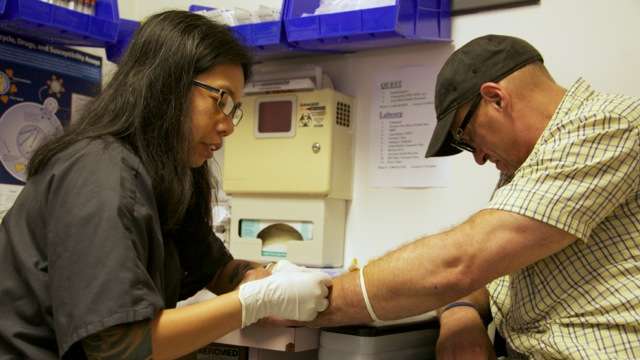Pennsylvania’s Medicaid eases restrictions on hepatitis C treatment

A phlebotomist takes blood for Hepatitis C testing during a patient's weekly visits (Nathaniel Hamilton/for Newsworks)
Pennsylvania is easing its restrictions on who can access hepatitis C treatments through Medicaid.
The new hep C drugs are considered game changers, with fewer side effects and high cure rates. But they’re “extraordinarily expensive,” notes a Pennsylvania spokesperson, with combinations costing upwards of $100,000.
That’s put dozens of states in a fiscal and ethical bind. It’s even spurred numerous lawsuits, challenging the drug companies’ price, from groups like SEPTA (a judge dismissed that suit this spring).
Pennsylvania’s Medicaid had limited treatment to those with advanced liver disease.
“I can’t think of any other disease where we would say we’re going to wait until somebody is cirrhotic or at the end of an organ injury before we would consider treatment,” said Dr. Vincent Lo Re, who cares for hepatitis C patients at the University of Pennsylvania and studies treatment access.
The state’s pharmacy board has now loosened who can qualify for the drugs within Medicaid’s fee-for-service program, making people with “less severe” liver disease eligible. The board recommended the changes at its May meeting, and they took effect the end of July.
The board also struck down a rule that a patient must be completely drug or alcohol free. People who are coinfected with HIV are also automatically eligible.
In an emailed statement, Kait Gillis with the Pennsylvania Department of Human Services wrote the board made the revisions based on the following:
“(1) recent updates to national and international treatment guidelines to include newly available treatment options; (2) evaluation of numerous clinical trials; and (3) recommendations of an expert Center for Excellence infectious disease specialist.”
While the changes only apply to Medicaid beneficiaries in fee-for service (most go through managed care organizations), Dr. Stacey Trooskin, with the Drexel Health Partnership, thinks the board’s move is “a step forward” and will lead to more patients getting treatment and improved health.
“This is really important because if you treat the disease early enough then we send you back out into the general population almost as if you were never infected,” said Trooskin. “But if we wait until the liver damage is advanced enough, then I need to screen you for hepatitis carcinoma for the rest of your life.”
As for the cost, Gillis wrote that the state will continue to monitor the impact, but federal rebates and discounts directly negotiated with drug companies is “helping to alleviate some of the high cost of these drugs.”
And as more hepatitis C drugs have hit the market in recent months, that’s increased competition, and lowered the cost of the drugs, said Dr. Trooskin, who attended and presented at the state pharmacy board meeting when the vote took place.
“They [the state] want to serve their constituents well, but what has been prohibiting them from doing that is the drug pricing,” said Trooskin. “Over the last couple of months, we’ve seen new drugs come to the market from competitors, and with that there’s been price competition that’s dropped the pricing down. And so the state can now received greater discounts on those medications.”
When questioned about the price, one of the main drugmakers, Gilead, has defended it, pointing to the long-term benefits of a short-term treatment that can prevent costly liver transplants down the road.
The state’s new rules also selected Abbvie’s Viekira Pak as the preferred treatment.
Last year, Pennsylvania estimated about 20,000 people with Medicaid have Hepatitis C.
Hepatitis C is spread through blood to blood contact. An estimated 3 million Americans are infected. More people die from it than AIDS. It’s often called the silent epidemic because symptoms may not surface for years, but can lead to liver disease and cancer.
WHYY is your source for fact-based, in-depth journalism and information. As a nonprofit organization, we rely on financial support from readers like you. Please give today.

